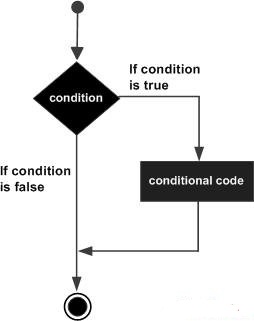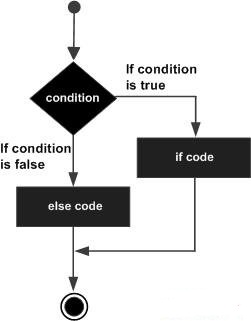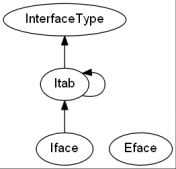if語句
if語句包含一個布爾表達式后跟一個或多個語句。
語法
if語句在Go編程語言的語法是:
if(boolean_expression)
{
/* statement(s) will execute if the boolean expression is true */
}
如果布爾表達式的值為 true,那么if語句里面代碼塊將被執行。如果if語句的結束(右大括號后)布爾表達式的值為false,那么語句之后第一行代碼會被執行。
流程圖:

例子:
package main
import "fmt"
func main() {
/* local variable definition */
var a int = 10
/* check the boolean condition using if statement */
if( a < 20 ) {
/* if condition is true then print the following */
fmt.Printf("a is less than 20\n" )
}
fmt.Printf("value of a is : %d\n", a)
}
讓我們編譯和運行上面的程序,這將產生以下結果:
|
1
2
|
a is less than 20;value of a is : 10 |
if...else語句
if語句可以跟著一個可選的else語句,布爾表達式是假時它被執行。
語法
在Go編程語言中的if ... else語句的語法是:
if(boolean_expression)
{
/* statement(s) will execute if the boolean expression is true */
}
else
{
/* statement(s) will execute if the boolean expression is false */
}
如果布爾表達式的值為true,那么if代碼塊將被執行,否則else代碼塊將被執行。
流程圖:

例子:
package main
import "fmt"
func main() {
/* local variable definition */
var a int = 100;
/* check the boolean condition */
if( a < 20 ) {
/* if condition is true then print the following */
fmt.Printf("a is less than 20\n" );
} else {
/* if condition is false then print the following */
fmt.Printf("a is not less than 20\n" );
}
fmt.Printf("value of a is : %d\n", a);
}
當上述代碼被編譯和執行時,它產生了以下結果:
|
1
2
|
a is not less than 20;value of a is : 100 |
if...else if...else 語句
if語句可以跟著一個可選的else if ... else語句,這是非常有用的使用單個 if...else if 語句聲明測試各種條件。
當使用if , else if , else語句有幾點要記住使用:
if可以有零或一個else,它必須跟從else if后面。
一個if可以有零到個多else if并且它們必須在else之前。
一旦一個else if測試成功,其它任何剩余else if將不會被測試。
語法
if...else if...else在Go編程語言中語句的語法是:
if(boolean_expression 1)
{
/* Executes when the boolean expression 1 is true */
}
else if( boolean_expression 2)
{
/* Executes when the boolean expression 2 is true */
}
else if( boolean_expression 3)
{
/* Executes when the boolean expression 3 is true */
}
else
{
/* executes when the none of the above condition is true */
}
例子:
package main
import "fmt"
func main() {
/* local variable definition */
var a int = 100
/* check the boolean condition */
if( a == 10 ) {
/* if condition is true then print the following */
fmt.Printf("Value of a is 10\n" )
} else if( a == 20 ) {
/* if else if condition is true */
fmt.Printf("Value of a is 20\n" )
} else if( a == 30 ) {
/* if else if condition is true */
fmt.Printf("Value of a is 30\n" )
} else {
/* if none of the conditions is true */
fmt.Printf("None of the values is matching\n" )
}
fmt.Printf("Exact value of a is: %d\n", a )
}
讓我們編譯和運行上面的程序,這將產生以下結果:
|
1
2
|
None of the values is matchingExact value of a is: 100 |












